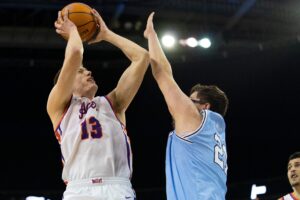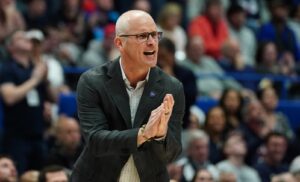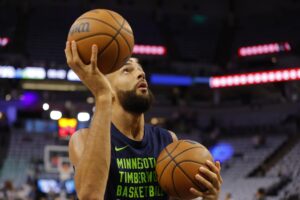The San Antonio Spurs All-Time Team has enough talent across the board to go toe-to-toe with any other all-time roster. Since the 1970s, great players have come and gone donning the black, white, and silver color scheme. In recent history, the Spurs have been the NBA’s model of no-frills competence and consistency. They’ve made their mark on the history books by rolling off 18 straight 50-win seasons (1999-2017) and 22 consecutive playoff appearances (tied for the NBA record). The San Antonio Spurs all-time team is a reflection of that understated dominance.
All-Time Team for the San Antonio Spurs
Starting Five
Point Guard – Tony Parker
Tony Parker was never considered the top point guard in the game during his career, but nobody ever questioned his ability in big moments. He was lucky to come into the league during the 2001-02 season when Tim Duncan and the Spurs were running on all cylinders. When he got a little more experience under his belt, he was taking big game NBA reps like few other players of his age range. His contributions as a player culminated in a 2007 Finals MVP honor, but he remained a pivotal factor in the Big Three’s final championship in 2014.
Shooting Guard – George Gervin
George Gervin is sometimes forgotten in conversations related to the NBA’s greatest scorers. That’s because his resume isn’t decorated with playoff accomplishments akin to Michael Jordan or Kobe Bryant. Still, his ability to simply put the ball in the hoop holds up with the best of them.
Though he lacks the championship hardware, Gervin’s dominance in scoring situations was just as good. He was such a lethal scorer that he earned four scoring titles in five years. Three of those were consecutive. He averaged 26.3 points per game in 11 seasons with the Spurs franchise. That peaked at 33.1 points per contest in the 1979-80 season. The greatest Spur before Tim Duncan and David Robinson totally deserves a starting spot on the all-time roster.
Small Forward – Kawhi Leonard
The Spurs and Kawhi Leonard did not have an amicable ending, but his talent and contributions are too great to leave him off. Before the mysterious injury drama of the 2017-18 season, Leonard was on track to be the franchise’s cornerstone. He averaged 16.3 points, 6.2 rebounds, 2.3 assists, and 1.8 steals over seven seasons with the Spurs. His averages would’ve been even higher if he played a full season two years ago. Still, not a bad haul for the 15th pick of the 2011 draft.
Leonard did miss the free throw that would’ve all but iced the 2013 NBA Finals against LeBron James and the Miami Heat, but his herculean two-way performance the following year played a major role in solidifying their payback. The Spurs couldn’t have exacted revenge against the Heat without Leonard. As Spurs superfan, Shea Serrano often remarks, if the Spurs Big Three era ended without avenging their failures against the Heat, it would’ve left an indelible stain on their legacy.
Power Forward – Tim Duncan
Tim Duncan is the most iconic Spur ever and easily the most deserving player on the San Antonio Spurs All-Time Team. He poured in averages of 19 points, 10.8 rebounds, 3 assists, and 2.2 blocks over nineteen seasons with the Spurs. Duncan also earned 15 All-Star appearances, two MVPs, 15 All-Defensive Team selections, and the 1997-98 Rookie of the Year award to go with five championships and three Finals MVPs. It’s no wonder he’s largely considered the greatest Power Forward of all-time.
In recent news, Duncan was brought on as an assistant coach on Greg Popovich’s coaching staff. The Spurs are hoping that Duncan can impart his knowledge onto younger players like Lonnie Walker IV, Derrick White, and Dejounte Murray. DeMar DeRozan and LaMarcus Aldridge could still learn a thing or two from Duncan as well.
Center – David Robinson
Before Tim Duncan came along, David Robinson was the epitome of what it meant to be a Spur. He was drafted by San Antonio in 1989 out of the United States Naval Academy, which led to his nickname, “The Admiral”. Robinson was a two-way beast at his peak, arguably the best big man in the game. He earned 10 All-Star appearances, one MVP award, eight All-Defensive team selections, one Defensive Player of the Year award, a rebounding title, a block title, and a hotly contested scoring title to go with two championship rings.
Robinson came close to championship glory multiple times as the sole star, but he finally won when Tim Duncan came around. They both doled equal damage upon the league as Twin Towers en route to the Spurs first title in franchise history (1999). As his powers faded and Duncan’s grew, he unselfishly took a backseat to let Duncan lead the Spurs to further success. Robinson’s legacy continued off the court, where he was one of the NBA’s most prominent philanthropic figures. David Stern even named the NBA Community Assist Award the David Robinson Plaque.
Bench
Point Guard – Avery Johnson
The second best point guard in franchise history behind Tony Parker. Avery Johnson and his contributions to the first Spurs title cannot be overlooked. He was the one who drained the Game 5 championship clincher against the New York Knicks in 1999. His number was fittingly retired by the Spurs in 2007. Things may have gone differently if the man known as “The Little General” wasn’t in his teammate’s faces like a drill sergeant.
He also played a role in saving Gregg Popovich’s job when the coach was on the hot seat. That potential “What If” scenario may have had a bigger impact than his game-winner. Who knows if the Spurs will four more championships with another coach besides Popovich.
Shooting Guard – Manu Ginobili
Young people 30 years from now will question why a guy with numbers like Manu Ginobili is in the Hall of Fame. Why has a guy with career averages of 13.2 points, 3.5 rebounds, and 3.8 assists enshrined next to the game’s greatest players? It’s going to be hard to explain it to them. Ginobili’s greatness must be appreciated from actually watching him play. Every once in awhile he would dazzle spectators with a mind-blowing play that had people questioning what they truly saw.
Combine his key role on four championship teams with his status as one of the game’s greatest sixth men, and it’s hard not to put him up there with the best of the best. His status on the Spurs All-Time team as a bench member is truly reflective of his career. But have no fear, he will be out there in crunch time with the ball in his hands.
Small Forward – Bruce Bowen
It’s a tough choice between Bruce Bowen and revered forward Sean Elliott. Convincing cases can be made for both. Bowen gets the edge this time thanks to his lockdown perimeter defense. An all-time team can always use a lockdown defender, and Bowen fits the bill better than almost anyone in history.
Bowen’s defense was so potent that it makes it on in spite of his modest offensive averages of 6.1 points, 2.8 rebounds, and 1.2 assists per game. His man-to-man prowess contributed to three championship rings for the Spurs throughout the 2000s. That was an invaluable resource when the league was chock full of talented wings like Kobe Bryant, LeBron James, Dwyane Wade, and Tracy McGrady.
Power Forward – LaMarcus Aldridge
LaMarcus Aldridge isn’t as accomplished as most of the players surrounding him, but he makes the cut off of sheer talent. He was the Spurs prized free-agent pickup of the 2015 summer. Surprisingly, marquee free agents rarely consider the Spurs. Even though he departed from Portland, Aldridge was a trailblazer in that regard.
Aldridge is heading into his fifth year with the Spurs. Over four seasons, he has averaged 20 points, 8.4 rebounds. 2 assists, and 1.2 blocks in 302 games. His health has held up too, suiting up for no less than 72 games in four years and even 81 last season. Spurs faithful are hoping his partnership with DeMar DeRozan or someone new will yield previous peaks of success. It’s a high bar, but perhaps someday Aldridge can make it as the other big man on the Spurs All-Time team.
Center – Artis Gilmore
Artis Gilmore was one of the most feared and respected big men in the ABA and NBA during the 1970s. He made his mark on the league as a member of the Kentucky Colonels and Chicago Bulls, then joined the Spurs in 1982 via trade. His partnership with George Gervin led to the Spur’s then-best regular-season record in franchise history of 53-29. Unfortunately, they fell to the Los Angeles Lakers in the 1982-83 Western Conference Finals.
The chemistry between Gervin and Gilmore fit like a glove. Gervin was responsible for collecting buckets while Gilmore focused on rebounding, blocking shots, and being a defensive menace in the paint. Before joining the Spurs he was a quiet, standoffish figure with the media. His time in San Antonio took him out of his shell. The NBA inducted Gilmore into the Hall of Fame in 2011.
Main Photo
Embed from Getty Images






